Where is the best place to stay in Paris for a tourist? The French capital is divided into 20 districts, each of which has its own unique features. This is a very heterogeneous city – sometimes the districts of Paris differ so much from each other that they resemble small isolated cities. Therefore, travelers who have stayed in different parts of Paris may have diametrically opposed impressions of the city.
For those who choose where to stay in Paris, we have prepared an overview of all 20 districts of the city and highlighted the features, advantages and disadvantages of each of them in terms of tourist accommodation. In addition, in this article we will share tips and useful information about Parisian hotels. So, we study, compare the districts and hotels of Paris and make the right choice!
Respectable and bourgeois: the most aristocratic districts of Paris
First arrondissement of Paris (Louvre – Arrondissement du Louvre). Next door to kings
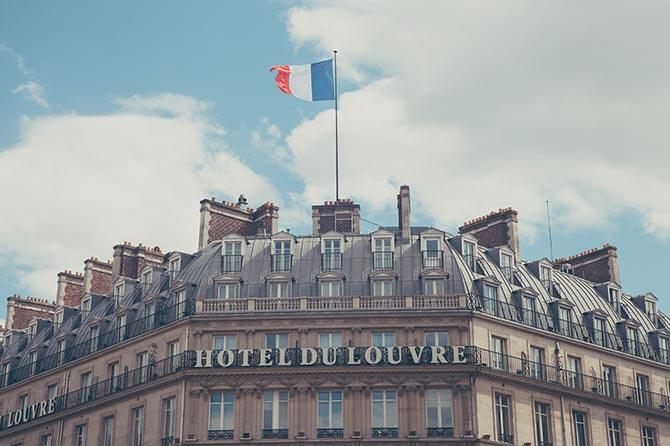
The first district of Paris is the most “tidbit” of the city for tourists. This is the very center of the city with the main attractions of Paris – the Louvre, the Tuileries Garden, the Palais Royal and Place Vendôme. There are more than 300 different architectural monuments and museums in this area. In addition, numerous shops will delight and lovers of shopping. Particularly large shopping center Forum des Halles.
All the most interesting things are within easy reach, but the prices for accommodation are appropriate. The very high cost of rooms is the main drawback of the first district. The cost of accommodation here is the highest compared to areas more distant from the center. However, if you really try hard, then here you can find a relatively inexpensive hotel, especially if you book in advance. But most likely, living conditions in inexpensive hotels will be at least modest – a hotel next door to the Louvre cannot be cheap without a reason.
In the first district, life is in full swing at any time of the day. Crowds of tourists and entertaining Parisians are concentrated near the Louvre and Forum des Halles – lovers of a relaxed holiday should take this into account when choosing a hotel. It can be quite noisy here, so carefully study the reviews and specify such nuances as the audibility in the rooms, the liveliness of the street on which the hotel stands, the proximity of nightclubs, bars and other hot spots. If you decide to afford the luxury of living in the heart of Paris, choose places in the quieter streets so that you can relax after intensive walks around the city.
The second district is business Burse (Arrondissement de la Bourse)
Business center of Paris. The smallest in area, but not in importance. Despite the fact that the second district is located next to the first, that is, almost in the very center of Paris, this is a much calmer area. If the area around the Louvre is filled with tourists from morning to night, then business life is in full swing here: behind the walls of the Paris Bourse, numerous banks and offices, which are numerous here. In addition, in the second arrondissement of Paris there is the Opéra-Comique, the Museum of Perfume, elite stores for every taste (although not for every budget!)
Due to its central location and, unlike the first arrondissement, relative calm, this area is very convenient for tourists who want to live in the heart of Paris. But the cost of accommodation in the second district is as high as in the first.
The seventh arrondissement is the respectable Palais Bourbon (Arrondissement du Palais Bourbon)
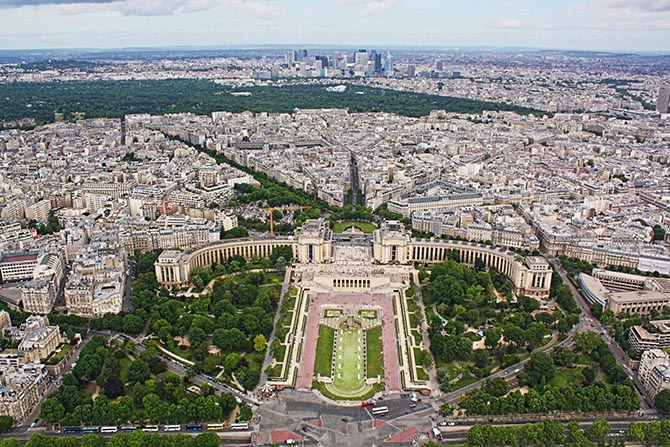
The Eiffel Tower, Les Invalides, Napoleon’s tomb and the Champ de Mars – all these attractions are located in the seventh arrondissement of Paris. The Orsay Museum of Fine Arts and the Rodin Museum are also located here. The abundance of attractions makes the seventh arrondissement of Paris a real magnet for tourists. A large number of ministries, embassies and international organizations – an important administrative center. By the way, in 2016, the Russian Spiritual and Cultural Center was opened here.
The area is comfortable and safe to live in. Only wealthy Parisians can afford to live here. And the hotels of the seventh arrondissement are mainly aimed at wealthy tourists who are willing to pay for the luxury of living next to the symbols of Paris.
Elite Eighth Arrondissement (Champs Elysees – Arrondissement de l’Élysée)
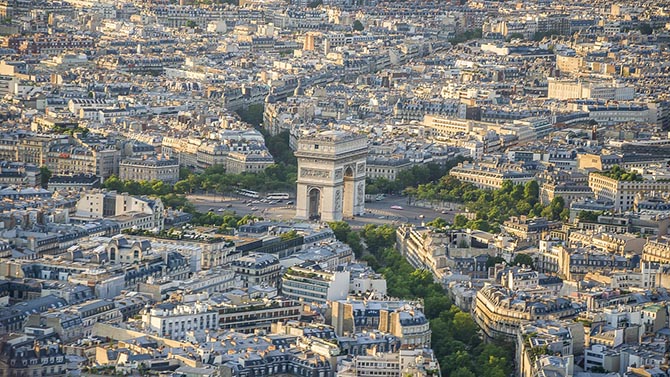
The eighth arrondissement is known, first of all, for the Champs-Elysées, where there are a huge number of tourists at any time of the day. Two important Parisian sights adjoin the Champs Elysees – the Champs Elysees and the Grand Palace. The famous Arc de Triomphe rises on the Place Charles de Gaulle, and on the Place de la Concorde you can see the ancient Egyptian obelisk of Luxor. And not far from the Seine embankment is the legendary Parisian cabaret Crazy Horse.
Given the abundance of legendary attractions and central location, it is not surprising that the eighth arrondissement of Paris is populated mainly by wealthy residents, and the cost of rooms in the hotels of the arrondissement is one of the highest in Paris. However, the area is rather big, and what has been said refers to that part of it that is adjacent to the Champs Elysees and the Louvre. The further north (and farther from the center), the more likely you are to find more affordable hotels.
The sixteenth district is the bourgeois Passy (Arrondissement de Passy)
One of the most respectable areas of Paris. Here you will not meet migrants – the district is inhabited mainly by representatives of the bourgeoisie. Living in the sixteenth district is prestigious, and just as expensive. Nearby is the Eiffel Tower, the Arc de Triomphe and the Champs Elysees. Directly on the territory of the district are the courts of Roland Garros, as well as a number of museums and expensive boutiques, most of which are located on Passy Street. However, you will have to travel to the Louvre and many other attractions by transport.
Authentic and relatively economical: where to experience authentic Parisian charm
Third district – authentic Temple (Arrondissement du Temple)
A calm and authentic area where you can feel the real, lively, non-touristic Paris. Although the most popular attractions are concentrated in neighboring districts, this area is no less interesting for its unique flavor and rich history. The historic Marais quarter is partially located here, in which both luxurious baroque palaces and old houses of ordinary Parisians have been preserved.
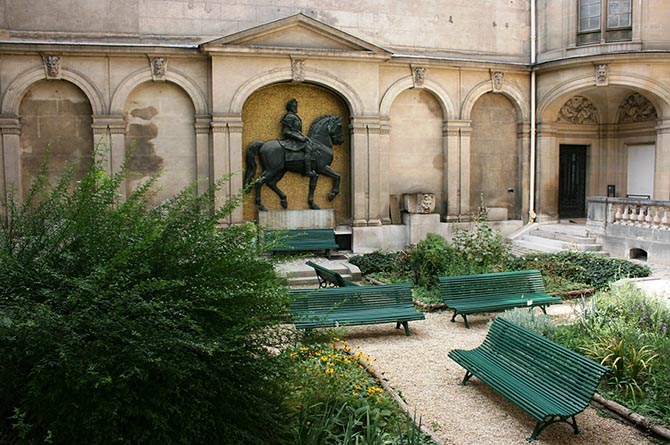
In the third district there is the Picasso Museum, the Carnavale Museum and other interesting places that not every tourist reaches. The area also borders on the famous Place des Vosges (the oldest in Paris). There is no tourist crowd in the third arrondissement, here you can see Paris through the eyes of the Parisians themselves, merge with local vacationers, walk along the beautiful streets of the Marais, remembering the events of past eras, drink wine on the terrace of one of the many restaurants …. In addition, there are many interesting and original shops here.
There are relatively few hotels in the area, and if you are lucky enough to find free rooms, the cost of accommodation will be on average lower than in the 1st and 2nd districts.
Fifth district – atmospheric Pantheon (Arrondissement de Panthéon)
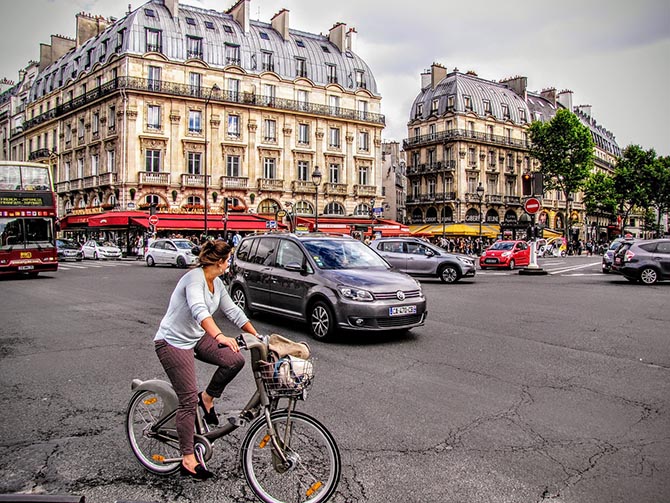
The main attraction of the fifth arrondissement of Paris is the Sorbonne, one of the oldest universities in Europe. The Sorbonne is located in the student Latin Quarter, whose name is due to the fact that the first generations of university students spoke mainly Latin. Today, the fifth arrondissement remains the educational center of Paris. In addition to educational institutions, there are a large number of interesting museums here – the National Museum of Natural History, the Museum of the Middle Ages, the Museum of the Police Prefecture of Paris and many others. In this area, it will also be interesting for tourists to see the famous Pantheon – a kind of mausoleum of prominent figures of France, as well as the ruins of Roman baths dating back to the 1st century BC.
Hotels in the fifth district will delight you with more affordable prices than in the first four. In addition, this area is one of the most “Parisian” in its atmosphere. At the same time, it differs from the rest with a special charm associated with the university and intellectual life that is in full swing here. Beautiful boulevards and squares, many cozy cafes, pastry shops and shops, unique bookstores and secondhand bookshops. It is very interesting, picturesque and atmospheric, while there are not so many tourists. However, some streets can be noisy (it’s a student center after all, and the nightlife is very active too!), so pay attention to hotel reviews.
District 6 – exquisite Luxembourg (Arrondissement du Luxembourg)
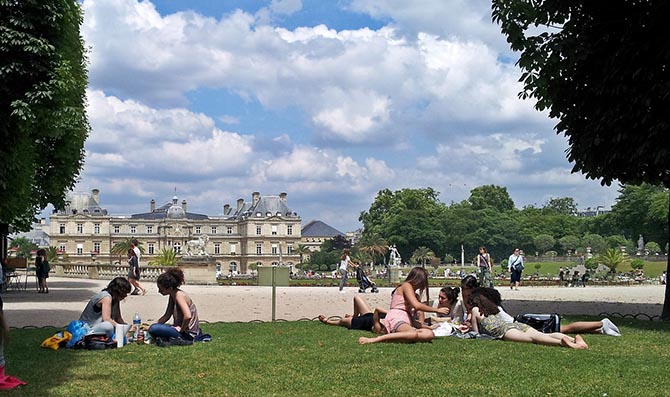
One of the favorite areas of Paris for both the Parisians themselves and for tourists who are experts in the French capital. From here it is easy to get to the main attractions of Paris. At the same time, there is no such tourist crowd as, for example, in the first district, and the cost of rooms in hotels is slightly lower.
The sixth arrondissement is mainly inhabited by members of the Parisian intelligentsia. The area is very pleasant, refined and atmospheric: quiet streets, elegant buildings, the old Saint-Germain-des-Prés quarter, which is one of the symbols of Paris, the Luxembourg Gardens, where locals love to spend time…
Noisy, fun and young: there may be no time for sleep here!
Arrondissement 4 – lively Hotel de Ville
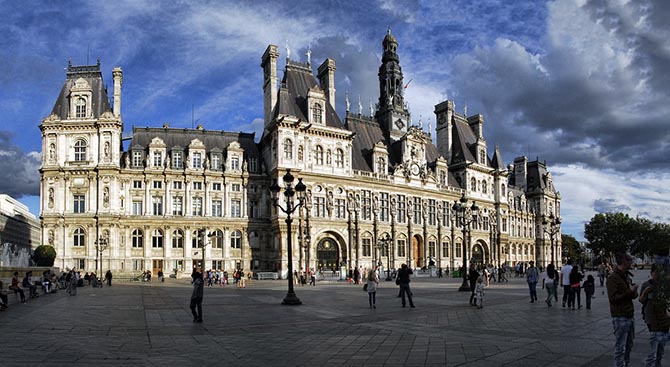
The tertiary arrondissement of Paris “captures” both a part of the old Marais quarter (which is partly located on the territory of the 3rd arrondissement) and the legendary Ile de la Cité, the birthplace of the city. The buildings belonging to the Marais quarter have remained virtually untouched since their construction in the 17th century. It is here that the Place de la Bastille and the Center Pompidou are located. And on the island of Cité is the legendary Notre Dame de Paris (Notre Dame Cathedral) and other iconic sights.
The fourth district attracts young people who relax in local bars and clubs, and they are represented here in abundance. Therefore, it is better to look for hotels or choose rooms that do not face noisy streets, and also pay attention to reviews (noise isolation, location, contingent …)
From here you can easily get to the main attractions of Paris (many of them are within walking distance), and you can always find places to eat and have fun. In general, this area is convenient for living, especially for young people. Here you can find more budget options than in the 1st and 2nd districts, but in good hotels the prices will still be quite high.
Eleventh District – Youth Popincourt (Arrondissement de Popincourt)
One of the busiest and youngest areas of the city. Near the main attraction of the district – Place de la Bastille – there is a huge number of all kinds of establishments in which young people have fun until late at night. The eleventh district is to the taste of those who are not embarrassed by the noise and the contingent, consisting mainly of drunken youth.
From this area you can quickly get to the city center, and the cost of living in hotels is relatively low. But when choosing a hotel in this area, you should stay away from the border with the dysfunctional and criminal 20th district.
18th arrondissement – bohemian Butte-Montmartre
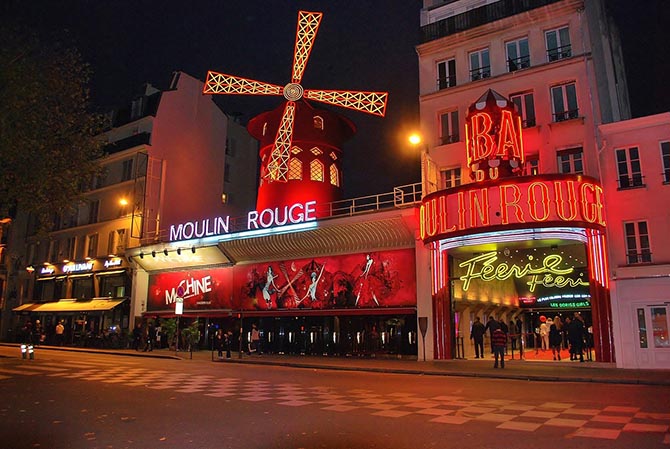
The most noisy and bohemian district of Paris. The main attraction and symbol of the area is the Sacré-Coeur Basilica, built on top of the Montmartre hill, which is the highest point in the city. Montmartre is famous for its many interesting places associated with the rich history of Paris and its rich cultural life of the late 19th and early 20th centuries. The legendary cabaret Moulin Rouge is also located here, next to which it is fun and noisy at any time of the day.
Despite the wide popularity of the area, living in it is not very convenient. It should be borne in mind that the 18th district is an entertainment area, located, moreover, at a distance from the city center. It is definitely not worth planning accommodation with children here. Also, the district is not too suitable for lovers of a measured and quiet life. Life is in full swing here at night, especially in the Red Light District. It is also worth bearing in mind that pickpockets and scammers are operating in the busiest areas of Buttes-Montmartre. The center will mainly have to be reached by transport. At the same time, the cost of living is relatively low (by Parisian standards, of course) – here it is quite possible to choose budget options.
Budget and (sometimes) calm: non-tourist areas away from the center
Artistic Ninth Arrondissement (Opera – Arrondissement de l’Opéra)
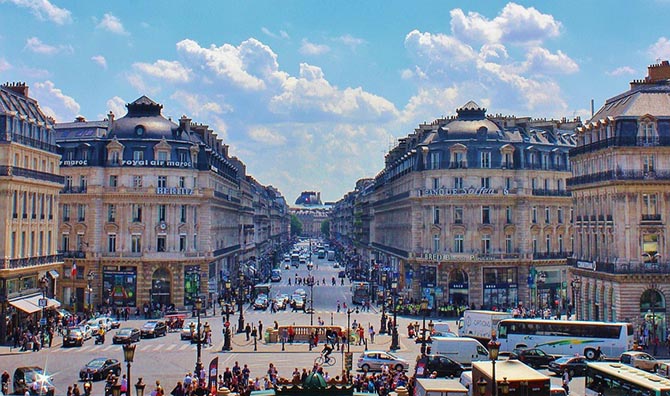
The ninth arrondissement of Paris will be of interest to lovers of art and shopping. Here is the Opera Garnier – one of the leading opera houses in the world, as well as the largest and oldest department store in Paris – Galeries Lafayette. Not far from the gallery is the Printam shopping center with the most fashionable shops.
In the ninth district, you can stay quite comfortably and relatively inexpensively. From here it is easy to get to the central attractions (from some hotels it is quite possible to walk to “tourist” places on foot). But hotels bordering on the noisy and bohemian Montmartre (this is already the 18th arrondissement of Paris) will not suit lovers of a relaxing holiday. It is better to choose hotels closer to the Opera.
12th arrondissement – non-tourist Paris (12e arrondissement de Paris)
The twelfth arrondissement is located at some distance from the center, it is an inexpensive and quiet residential area of Paris. The main attraction of the district is the Gare de Lyon, an architectural masterpiece of the early 20th century. Hotels in close proximity to the station will be convenient for those who arrive or leave it. In this part of Paris you can find budget accommodation options. But in order to get to the center, you have to use transport. When choosing a hotel, you should avoid accommodation options on the border with the 20th arrondissement mentioned above.
The thirteenth district – a piece of Asia in Paris (Tapestry, or Arrondissement des Gobelins)
An Asian area that is not at all like the Paris we usually imagine. Here is the Parisian Chinatown (Chinatown), and therefore the place is unusual for Paris. However, some parts of the district are quite “Parisian” (for example, in the area of Place Italia, close to the Luxembourg Gardens and the Botanical Gardens). Also here are the National Library, Piazza d’Italie, as well as many inexpensive hotels. In general, this area is not dangerous – the inhabitants here are quite friendly and peaceful.
The fourteenth district – away from the bustle (Observatoire, Observatoire)
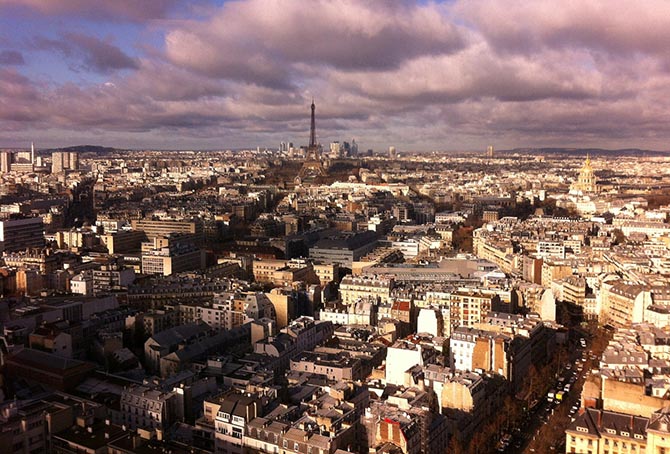
Another quiet and inexpensive district, remote from the center. However, it is not as simple as it seems at first glance. In the last century, Montparnasse Boulevard, located in this area, was a meeting place for celebrities and representatives of the metropolitan bohemia. Today, the district no longer attracts bohemians, but numerous cafes and restaurants still operate on the boulevard.
The most interesting objects for tourists in this area are the Montparnasse Tower (causing a lot of controversy), which offers a fantastic view of the Eiffel Tower, and the cemetery of the same name. And here is the entrance to the Parisian catacombs.
The cost of accommodation in the 14th district is comparable to the 5-6 districts, although you can find more budget options. Most of the central attractions need to be reached by transport.
Fifteenth arrondissement – democratic and comfortable (Vaugirard – Arrondissement de Vaugirard)
This is the largest area of Paris. There are no particularly famous attractions and proximity to the center, but there is silence, comfort and safety, as well as very inexpensive housing. It is especially convenient to settle near the border of the 7th district – from there you can quickly get to the city center.
Calm Seventeenth arrondissement (Batignolles Monceau, Batignolles Monceau)
The 17th arrondissement cannot boast of famous sights, but it is a calm and quite respectable area. All hotels, shops and restaurants are focused mainly on wealthy residents and guests of the district. However, due to some remoteness from tourist places, the average cost of living here is somewhat lower than in the central regions.
Is it worth the risk? Areas of Paris you shouldn’t stay in
Tenth arrondissement – restless Entrepot (Arrondissement de l’Entrepôt)
The tenth district is filled with migrants, especially in the area between the North and East stations. There is a fairly high crime rate, and most tourists try to stay away from this area. But bold and unpretentious travelers on a very limited budget find cheap hotels here, as well as many hostels.
Disadvantaged Nineteenth and Twentieth arrondissement (Buttes-Chaumont and Menilmontant)
Tourists are usually not recommended to stay in the 19th and 20th districts – these places have a reputation for troubled criminal areas. However, through the efforts of the authorities, the 19th district is gradually being ennobled, and wealthy citizens are even beginning to settle near the Saint-Martin Canal.
In the 20th arrondissement, the situation is quite sad – this is a district of migrants, it is very dangerous to be in it.
Despite the cheapness of hotels in these areas, most tourists try to settle closer to the center and away from these two districts.
So, let’s sum up. Of course, choosing a hotel in Paris will depend on your goals, preferences and budget constraints. But still, we highlight the areas of Paris that are most convenient for tourists and leading in reviews. If you do not go into details, then these are the first six districts that make up the “heart” of Paris. Among them you can find a variety of options for every taste and almost every wallet:
- expensive tourist places (for example, hotels in the vicinity of the Louvre and the Champs Elysees);
- no less expensive, but less touristy (for example, a business center – 2nd district, or areas adjacent to the Eiffel Tower and Champ de Mars – 7th district)
- more budgetary, and at the same time more authentic “Parisian” areas. For example, Marais, which is “divided” between the 3rd and 4th districts. Or the Latin Quarter, where the heart beats not only of the 5th arrondissement, but also of the university and scientific life of Paris. Saint-Germain des Pres, an exquisite old, truly “Parisian” quarter of the 6th arrondissement, is one of such distinctive districts, from where many attractions can be easily reached.
According to the experience of our team and the reviews of tourists, these areas are the most convenient for living in Paris. They are good both because they make it easy to get to most of the sights, and excellent tourist infrastructure (everything you need is nearby, a wide selection of cafes, shops, etc.), and their originality and unique atmosphere.
Tips: What else to consider when choosing a hotel in Paris
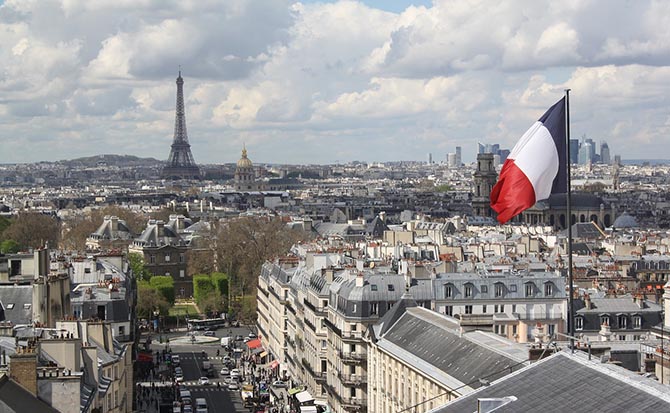
Transport accessibility
If you want to walk to the main attractions of Paris on foot, you should check the address of the hotel in advance and check on the map how you will get to certain places. Even in the central districts of Paris, hotels can be located at some distance from the sights you are interested in (for example, in the 8th arrondissement, you can stay near the Champs Elysees, in the very “heart” of Paris, or you can also stay on the border with the 17th arrondissement, which is already much further) .
If you plan to actively travel around Paris by public transport, then check the proximity of metro stations and other public transport stops, think over which routes and what transport you will use to get to your destinations.
In some areas that are located far from the center, but at the same time have their own famous attractions (for example, Trocadero, Montparnasse, etc.), you can use tour buses to get to other popular places. Among these buses are Big Bus, Open Tour, Bus Foxity.
It is also worth considering how you will get from the airport (or from the train station if you come to Paris by train) and back. Of course, taxis, as well as bus shuttles, will be able to take you directly to the hotel, in whatever area of Paris it may be. But do not forget about the intense Parisian traffic and the high cost of a taxi. Much faster and cheaper to get on the RER train. If you are coming from Charles de Gaulle airport, it will be very convenient if the hotel is close to RER line B stations (among the major stations in the center of Paris are Chatelet Les Halles, Notre Dame, Luxembourg). In this case, you can easily take the train to the city center, and from there you can walk to the hotel on foot, without additional transfers. The Orly airport connects to Paris on the same line B, however, in addition to the RER, you will need to travel on a special Orlyval train.
Close proximity to shops and cafes
As a rule, breakfasts in Parisian hotels do not delight most tourists. Of course, this does not apply to luxury hotels. But if you book a modest budget hotel, be prepared for the most modest breakfast: a croissant, maybe another bun with jam, and not the best coffee … Of course, there are always exceptions, but this is the general trend. Real Parisian delicacies will be waiting for you not at the hotel, but in local cafes and restaurants. And perhaps even in shops and supermarkets (if you plan to eat on your own). Many tourists refuse the “built-in” breakfast at the hotel and prefer to start the day with a trip to authentic cafes. Take note of this and check if there are such places near the hotel.
Accommodations
When studying hotels in Paris, pay special attention to the reviews of tourists and living conditions. As a rule, rooms, especially in the center, are very small (especially single rooms). If you suddenly come across a suspiciously cheap option in the very center – look for a catch. It may offer facilities on the floor (shared bathroom), or there are other features. To avoid unpleasant surprises, study the reviews of tourists in advance.
Soundproofing
If you have chosen a hotel in the very center, or in one of the “fun” districts of Paris (for example, in Montmartre, in the 4th or 11th arrondissement), be prepared for noisy streets that never “sleep”. If you are not a fan of the nightlife, or you just want to be able to relax in your room, check questions related to noise and soundproofing in advance: is the street full of “hot” places where the windows face, what is the audibility in the rooms…. Reviews of other tourists will help you make the right choice.
Cancellation option
When booking hotels on booking.com, most often it is possible to cancel the reservation made, without any fines and problems. But not always, so carefully read the conditions of the reservation. If you are still not quite sure about your itinerary, then make sure that the option you choose allows you to cancel your booking, check until what date this can be done without penalty.
Surcharges (city tax, etc.)
When staying in hotels or apartments in Paris, tourists pay a city tax. As a rule, it is calculated separately (based on the number of nights) and is not included in the price. Pay attention to detailed information about what is included and not included in the booking to avoid unpleasant surprises.
How to save money on a hotel in Paris

With the right approach, you can quite realistically find an inexpensive hotel even in the “expensive”, central districts.
Book in advance
The sooner you start searching and booking a hotel in Paris, the more likely you are to find a profitable option. Paris is one of the most popular tourist destinations, so cheap and good rooms quickly “fly away”.
Prepaid rooms (no cancellation option)
If the trip will definitely take place on the selected dates, and you do not plan to cancel your booking, you can save a lot by choosing a room without canceling the booking. Many hotels offer big discounts to guests who guarantee check-in and are willing to pay in advance.
Rooms without breakfast
As we mentioned above, breakfasts in ordinary hotels in Paris are more than modest. If breakfast is not automatically included in the room rate, but is provided upon request, you can refuse it and eat on your own: buy food in stores (check if there is a refrigerator, kettle, etc. in the room) or have breakfast in inexpensive cafes or pastry shops, if there are some close to the hotel.
Plan your trip during the low season
Between November and February (excluding the winter holidays, of course) many hotels offer lower rates. If you are not tied to specific seasons or dates, then choose a period with a lower influx of tourists if you want to save money.
Book apartments, guest houses or even hostels
In Paris, a wide variety of types of accommodation are widely represented. In addition to traditional hotels, you can choose apartments (apartments in residential buildings rented to tourists) or democratic guest houses and boarding houses. This allows you not only to save money, but also to plunge into the real Parisian life!
Apartments in Paris
Well, the most unpretentious young travelers save on housing in Paris, staying in hostels where they share a room with other tourists. This is the most economical option, but, of course, it is not suitable for everyone.
“Catch” special offers
Even hotels in Paris, spoiled by an abundance of guests and high demand, sometimes indulge tourists with special offers and discounts on certain dates. For example, on booking.com there are “deals of the day” that are valid for a limited time and allow you to book accommodation at a discount.
Most likely, you are not going to Paris to sit in a hotel room. This city is conducive to long walks and immersion in the whirlpool of its active cultural life. However, after a busy day or evening, it is so nice to come to a place where you can have a good rest and gain strength for new exploits of conquering Paris! A special experience is to feel like a real Parisian or a Parisian and live next to the old buildings and picturesque streets of Paris…. We wish you to make a good choice and feel at home in Paris! Happy Travel!
